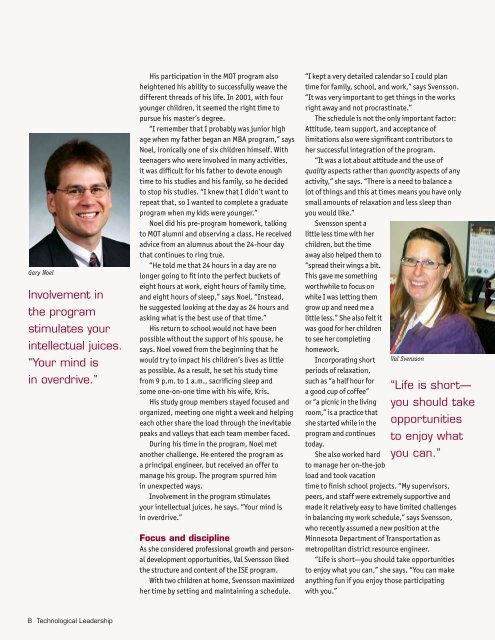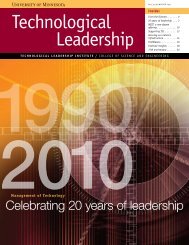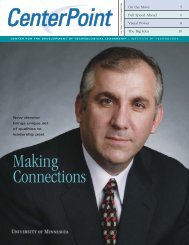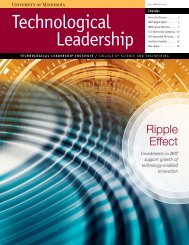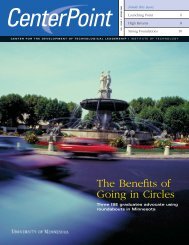Critical - Technological Leadership Institute - University of Minnesota
Critical - Technological Leadership Institute - University of Minnesota
Critical - Technological Leadership Institute - University of Minnesota
You also want an ePaper? Increase the reach of your titles
YUMPU automatically turns print PDFs into web optimized ePapers that Google loves.
Gary Noel<br />
Involvement in<br />
the program<br />
stimulates your<br />
intellectual juices.<br />
“Your mind is<br />
in overdrive.”<br />
His participation in the MOT program also<br />
heightened his ability to successfully weave the<br />
different threads <strong>of</strong> his life. In 2001, with four<br />
younger children, it seemed the right time to<br />
pursue his master’s degree.<br />
“I remember that I probably was junior high<br />
age when my father began an MBA program,” says<br />
Noel, ironically one <strong>of</strong> six children himself. With<br />
teenagers who were involved in many activities,<br />
it was difficult for his father to devote enough<br />
time to his studies and his family, so he decided<br />
to stop his studies. “I knew that I didn’t want to<br />
repeat that, so I wanted to complete a graduate<br />
program when my kids were younger.”<br />
Noel did his pre-program homework, talking<br />
to MOT alumni and observing a class. He received<br />
advice from an alumnus about the 24-hour day<br />
that continues to ring true.<br />
“He told me that 24 hours in a day are no<br />
longer going to fit into the perfect buckets <strong>of</strong><br />
eight hours at work, eight hours <strong>of</strong> family time,<br />
and eight hours <strong>of</strong> sleep,” says Noel. “Instead,<br />
he suggested looking at the day as 24 hours and<br />
asking what is the best use <strong>of</strong> that time.”<br />
His return to school would not have been<br />
possible without the support <strong>of</strong> his spouse, he<br />
says. Noel vowed from the beginning that he<br />
would try to impact his children’s lives as little<br />
as possible. As a result, he set his study time<br />
from 9 p.m. to 1 a.m., sacrificing sleep and<br />
some one-on-one time with his wife, Kris.<br />
His study group members stayed focused and<br />
organized, meeting one night a week and helping<br />
each other share the load through the inevitable<br />
peaks and valleys that each team member faced.<br />
During his time in the program, Noel met<br />
another challenge. He entered the program as<br />
a principal engineer, but received an <strong>of</strong>fer to<br />
manage his group. The program spurred him<br />
in unexpected ways.<br />
Involvement in the program stimulates<br />
your intellectual juices, he says. “Your mind is<br />
in overdrive.”<br />
Focus and discipline<br />
As she considered pr<strong>of</strong>essional growth and personal<br />
development opportunities, Val Svensson liked<br />
the structure and content <strong>of</strong> the ISE program.<br />
With two children at home, Svensson maximized<br />
her time by setting and maintaining a schedule.<br />
“I kept a very detailed calendar so I could plan<br />
time for family, school, and work,” says Svensson.<br />
“It was very important to get things in the works<br />
right away and not procrastinate.”<br />
The schedule is not the only important factor:<br />
Attitude, team support, and acceptance <strong>of</strong><br />
limitations also were significant contributors to<br />
her successful integration <strong>of</strong> the program.<br />
“It was a lot about attitude and the use <strong>of</strong><br />
quality aspects rather than quantity aspects <strong>of</strong> any<br />
activity,” she says. “There is a need to balance a<br />
lot <strong>of</strong> things and this at times means you have only<br />
small amounts <strong>of</strong> relaxation and less sleep than<br />
you would like.”<br />
Svensson spent a<br />
little less time with her<br />
children, but the time<br />
away also helped them to<br />
“spread their wings a bit.<br />
This gave me something<br />
worthwhile to focus on<br />
while I was letting them<br />
grow up and need me a<br />
little less.” She also felt it<br />
was good for her children<br />
to see her completing<br />
homework.<br />
Incorporating short Val Svensson<br />
periods <strong>of</strong> relaxation,<br />
such as “a half hour for<br />
a good cup <strong>of</strong> c<strong>of</strong>fee”<br />
or “a picnic in the living<br />
room,” is a practice that<br />
she started while in the opportunities<br />
program and continues<br />
to enjoy what<br />
today.<br />
She also worked hard you can.”<br />
to manage her on-the-job<br />
load and took vacation<br />
time to finish school projects. “My supervisors,<br />
peers, and staff were extremely supportive and<br />
made it relatively easy to have limited challenges<br />
in balancing my work schedule,” says Svensson,<br />
who recently assumed a new position at the<br />
<strong>Minnesota</strong> Department <strong>of</strong> Transportation as<br />
metropolitan district resource engineer.<br />
“Life is short—you should take opportunities<br />
to enjoy what you can,” she says. “You can make<br />
anything fun if you enjoy those participating<br />
with you.”<br />
“Life is short—<br />
you should take<br />
<strong>Technological</strong> <strong>Leadership</strong>


